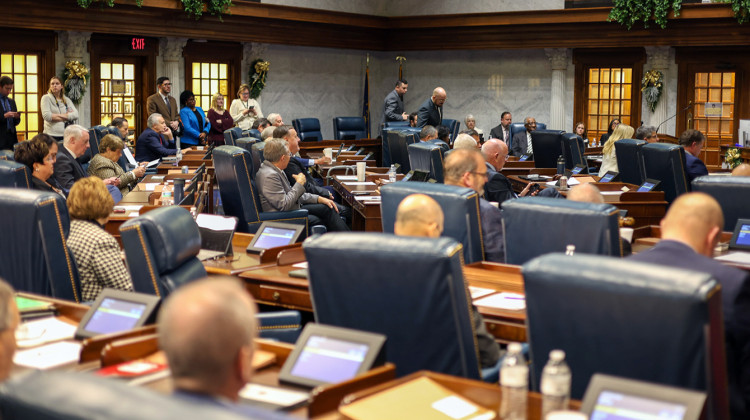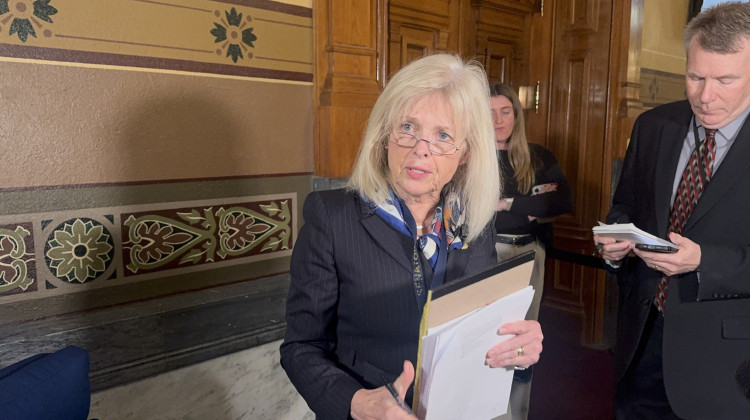Lawmakers gave Gov. Mike Pence just a sliver of the expansive pre-kindergarten program he’d been seeking but assigned him significant responsibility in getting the state-funded classes going.
On the last day of the 2014 legislative session, the Republican-controlled House and Senate approved a compromise bill that creates a five-county pilot preschool program.
The bill authorizes Pence to spend up to $10 million to launch classes as early as this fall. But he must find savings within the Family and Social Service Administration to pay for it. And FSSA and the participating preschool programs must use grants or private donations to fund at least 10 percent of preschool costs.
The bill’s author, Rep. Bob Behning, R-Indianapolis, said the plan encourages only high quality programs with academic rigor and that parents must participate.
“We’ll make sure that any parent that enrolls their child understands this is not just a day care program but this is an early childhood education program,” Behning said. “We do have an attendance (requirement) so we make certain they attend on a regular basis.”
The House approved the bill 92-8 and the Senate passed it 40-8. It includes a study that will follow participating students through the third grade and explore additional ways to pay for a statewide program.
Pence had originally sought state-funded pre-kindergarten for all low-income children in Indiana. But lawmakers were concerned about the cost – and some GOP senators questioned whether preschool is effective.
In the last few weeks, the governor has been traveling the state visiting pre-K programs to try to win support for his plan. On Thursday, Senate Appropriations Chairman Luke Kenley, R-Noblesville, said the compromise measure “puts the burden on Pence” to show that preschool works.
“I think the governor’s rather ambitious initial request seemed to be pretty overarching in terms of the people it covered,” Kenley said. The compromise legislation better hones the program so it serves only the poorest children and creates a study to determine whether the program helps the students achieve, he said.
To qualify, a student’s family could earn no more than 127 percent of the federal poverty limit. That’s about $28,380 for a family of four.
Democratic Sen. Earline Rogers of Gary, a former teacher and principal, called the pilot program “a step” toward statewide preschool. And she said it at least takes Indiana off the list of schools that don’t provide any state funding for preschool.
“We can now join Mississippi in a pre-K program,” she said.
Sen. Scott Schneider, R-Indianapolis, also said it will be a first step – but one that will lead to a larger program that’s too expensive.
“It’s the camel’s nose under the tent,” Schneider said. “This is a dangerous precedent.”
But Sen. Randy Head, R-Logansport, said the bill is limited and the pilot will expire unless the General Assembly votes to keep it in place.
“We’ll take a look at this longitudinal study, and if the program doesn’t work,” the legislature can end it, he said. “I don’t think the camel is going to get to far if the program doesn’t work.”
House Republicans had originally pushed to allow preschool participants to move directly into the state’s’ K-12 voucher program, without requiring them to try public schools first. But the final legislation doesn’t include that language.
The bill allows the pre-K program to launch as soon as this fall. But Claire Fiddian-Green, the governor’s special assistant for education innovation, said it’s likely the program would launch in 2015.
She said Pence is “grateful there is a well thought through pilot in place that could get up and running as soon as possible.”
The FSSA will be responsible for choosing the five counties for the pilot program.
Lesley Weidenbener is executive editor of TheStatehouseFile.com, a news website powered by Franklin College journalism students.
 DONATE
DONATE








 Support WFYI. We can't do it without you.
Support WFYI. We can't do it without you.